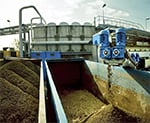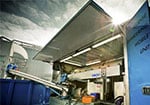New ways to see waste
Hard work, good timing and a clear customer focus. That’s the secret to family-owned Franchini’s success. The Italian business has more than 2,000 clients – and a passion for ecological waste disposal.
DATE 2023-11-28 AUTHOR Claudia B Flisi Franchini S.r.l Servizi Ecologici, a family-owned environmental waste business based in Bergamo, in northern Italy, has evolved from a one-man agricultural operation in the 1930s to today’s 11.6 million-euro company with 45 employees and more than 2,000 clients.
Franchini S.r.l Servizi Ecologici, a family-owned environmental waste business based in Bergamo, in northern Italy, has evolved from a one-man agricultural operation in the 1930s to today’s 11.6 million-euro company with 45 employees and more than 2,000 clients.
Its business covers several areas – specialized waste disposal, cleaning of municipal and industrial waste treatment plants, environmental reclamation, automated inspection of water pipes, tank cleaning and maintenance and, most recently, sludge dewatering with mobile machinery.
The latter is a service offered to customers who want to outsource some or all of their sludge dewatering. The volume of sludge (the mixture of water and solids separated from various types of water as a result of natural or artificial processes) has increased enormously in factories and wastewater treatment plants in recent years. So has the problem of disposing of it in cost-effective ways that do not damage the environment.
Enter sludge dewatering equipment. This equipment extracts the water from the sludge, expediting purification of the water and reducing the cost of transporting the sludge. The best dewatering equipment produces the smallest sludge volumes and, consequently, the lowest transport costs.
Decanters that met Franchini's needs
Franchini wanted to offer this service as an outsourcing solution to its customers, trucking in the machinery on an as-needed basis, overseeing the dewatering and removing the sludge and then moving the decanter on to the next client. "To do this, we needed easily transportable, high-performance, cost-effective equipment," says Andrea Franchini, one of the owners and the person responsible for technical issues at Franchini S.r.l Servizi Ecologici.
In 2003, Franchini purchased its first decanter. Since then, it has invested in five additional decanters, a total investment of EUR 1.5 million. Four of the decanters are Alfa Laval products.
 The Alfa Laval decanters met Franchini’s need for speed, power and, above all, flexibility in a compact package. The ability to adjust the decanters to suit specific requirements from a broad range of clients was crucial to Franchini, as was a manageable decanter size, due to Italy’s narrow roads and the municipal waste disposal plants with limited access.
The Alfa Laval decanters met Franchini’s need for speed, power and, above all, flexibility in a compact package. The ability to adjust the decanters to suit specific requirements from a broad range of clients was crucial to Franchini, as was a manageable decanter size, due to Italy’s narrow roads and the municipal waste disposal plants with limited access.
In 2006 alone, the company bought two Alfa Laval decanters. One of them, the mobile G2-95, was a pure leap of faith by the company. "It was a prototype, and we bought it on the basis of our trust in Alfa Laval," Franchini says. "We hadn’t even seen it when we committed to buy."
Market adaptation an ongoing process
The equipment has delivered on all the promises made for it, he says. The decanter does in three days what fixed models do in 10, and it is much more powerful for its size than competing models. Another advantage, says Franchini, is the quick setup time; the decanter is set up in two minutes and fully operative in 30 minutes. To pack up the equipment when the job is done takes only 30 minutes as well. The decanter also produces drier sludge than competing machines, which means fewer trips are needed when transporting the sludge, saving both time and transport costs.
In addition to hard work, shrewd judgement and an unwavering focus on customer needs, the company’s use of the latest technology is a strong factor in its success.
Fully 80 percent of Franchini’s customers have come to the company through word of mouth. "We began as an agricultural business, but we have always been organized like an industrial concern," says Franchini, whose grandfather Luigi founded the company as a family-owned business in the 1930s.
Back then, Luigi offered agricultural services to farmers in the then-heavily-agricultural area of his native Bergamo. As the region became more industrialized in the wake of the economic boom of the 1950s, his two sons adapted the business, offering ecological services as F.lli Franchini S.n.c. Spurghi (spurgo means "clearing" or "cleaning up" in Italian) starting in 1976.
By 1990, the company’s five employees were generating turnover of about EUR 400,000 a year. Three years later, the third generation of Franchinis decided to refocus their company.
"You have to keep redefining your business, adapting to the market, listening to your customers," Franchini explains. Since ecological concerns were becoming more important and waste handling more urgent, the family decided to leap into the emerging industry of industrial waste treatment and renamed the company Franchini S.r.l. - Servizi Ecologici.
Market adaptation is an ongoing process. Franchini is already focused on a future customer service, offering to dispose of waste on its own premises as well as those of clients. "The point is to consolidate our know-how and stay ahead of the market," Franchini says.
